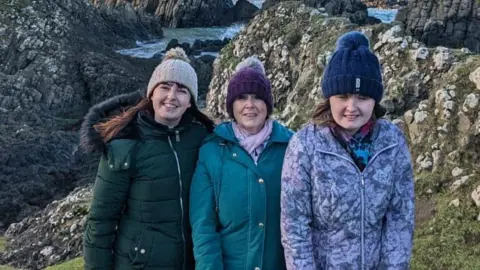Ombudsman 'did not address impact on my autistic sister'
 BBC
BBCPolice officers need improved training on dealing with autistic people following an incident in which a teenager was removed from a shop, a police watchdog has said.
Katie Mitchell, who is non-verbal and has learning difficulties, was carried out of a store in Lisburn last December after an incident at the till.
Her family complained that the officers had shown no understanding of Katie's situation, but a report by the police ombudsman found no misconduct.
Katie's sister, Dr Eileen Mitchell, said she was disappointed that the report did not highlight the "emotional and psychological impact" of the incident on Katie.
"Katie... just did not understand what was going on at the time, and I think that the police's response to it was just completely disproportionate," Dr Mitchell said.
Although the report found no misconduct, it said there should be enhanced training to "improve how they respond to members of the public who are autistic and may have individual communication needs".
What happened in the shop?
 Eileen Mitchell
Eileen MitchellAccording to Dr Mitchell, her sister and their parents were Christmas shopping in Lisburn last December when Katie spotted a £2 Thomas the Tank Engine DVD.
The 19-year-old entered the CeX shop through half-closed shutters and tried to buy the item, but staff would not permit her to do so because the tills had closed.
Katie became upset and she and her mother were asked to leave the store.
The family said Katie's mother then called the police in an effort to de-escalate the situation, but they were not happy with the response.
Footage of Katie being carried out of the shop by four officers and her father was posted on social media last December and sparked public concern.
At the time, Katie's family said she had been left traumatised and that police had shown no "understanding" or "empathy".
The Mitchells later lodged a complaint with the ombudsman which focused on the officers' training.
The Police Ombudman's Director of investigations, Nikki Davis, said the incident was "undoubtedly distressing" and emphasised the need for enhanced training.
The investigation reviewed police body-worn video footage, and it showed when they arrived "their preference was for her parents to remove her".
Her father "tried to move her physically", but was unable to do so.
Officers became involved "only after the young woman's father continued to experience difficulties managing on his own".
One officer was injured.
 Eileen Mitchell
Eileen MitchellPolice action 'the last resort'
Mrs Davis said footage of Katie being taken out of the shop was the subject of "significant public commentary".
After a review of the footage and audio, including body-cams and CCTV, Mrs Davis said officers who attended understood the "best approach" was for her parents to encourage her to leave.
"The police officers recognised from the outset that there was no simple solution and their action was a last resort in an incident which lasted for around 18 minutes from police entering the shop to leaving," the report added.
Although the report found there were no breaches of the PSNI's code of ethics, it exposed a gap in current training, leading directly to the recommendation that officers receive enhanced training.
It continued: "[This] equips them to engage with, and respond to, any autistic person, but especially a person who speaks few or no words and may communicate in other ways."
Fears training will be 'tick box exercise'
 Eileen Mitchell
Eileen MitchellKatie's sister, Dr Mitchell, said she was not "overly surprised" by the report's outcome but reiterated her belief that the officers' actions were disproportionate.
She also expressed her worry about how the enhanced training would be implemented and monitored.
"Is it going to be the case that it doesn't have to be mandatory, or that an officer will sit down in front of a computer and look at a few videos?"
She said she did not want it to be a "tick box exercise".
Dr Mitchell said that since the incident Katie was "really frightened" when she saw police officers.
"We have a great respect for the police force, it's an extremely difficult job that they do," she said.
"But now when we go out in public with Katie, if she sees a police officer she'll start crying because she'll not know if something's going to happen."
She said the family no longer goes shopping in Lisburn anymore and have had to "change and adapt".
What have police said?
The Police Service of Northern Ireland (PSNI)'s Ass Ch Con, Ryan Henderson, said he welcomed the report's findings.
"This was a very difficult and complex set of circumstances for everyone involved and we welcome the confirmation from the ombudsman's report that no officer should face any misconduct as a result of this investigation," he added.
ACC Henderson also said the report recognised the efforts the officers made to support the young woman's parents to "diffuse the distressing situation they found".
He added while training exists for front-line officers in dealing with vulnerable individuals and mental health, "there is no specific input for front line officers on strategies for dealing with those they encounter who may be non-verbal".
"In keeping with the recommendation we will now consider how best to incorporate this element into future training."
